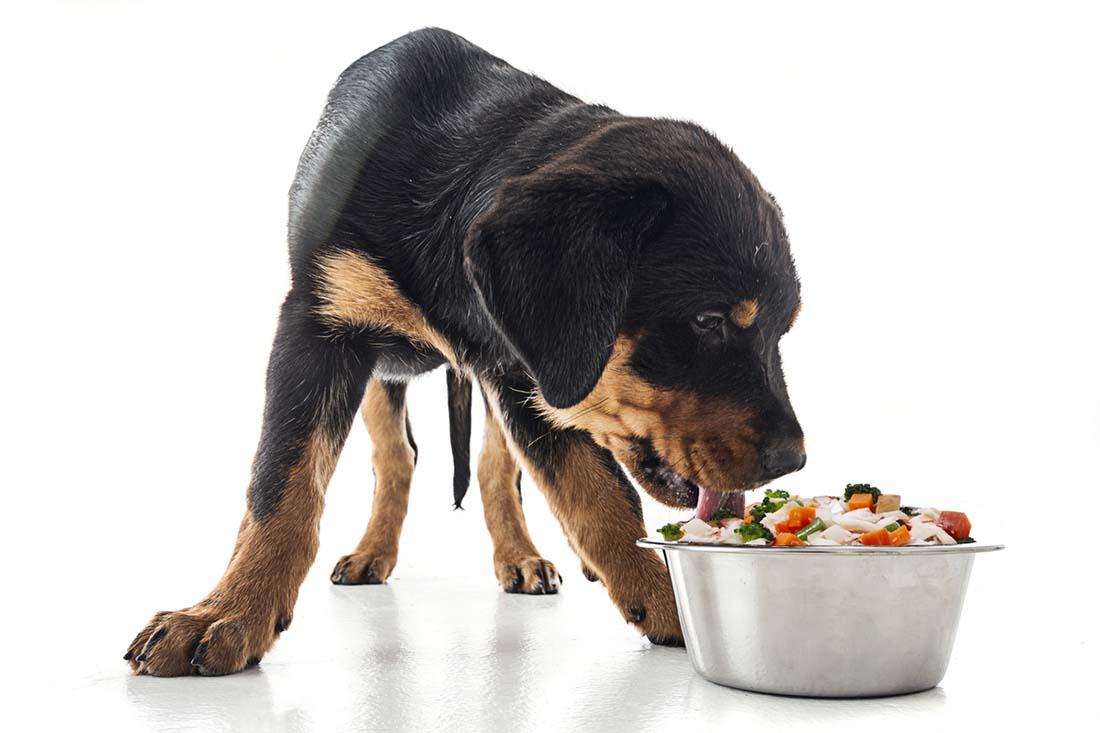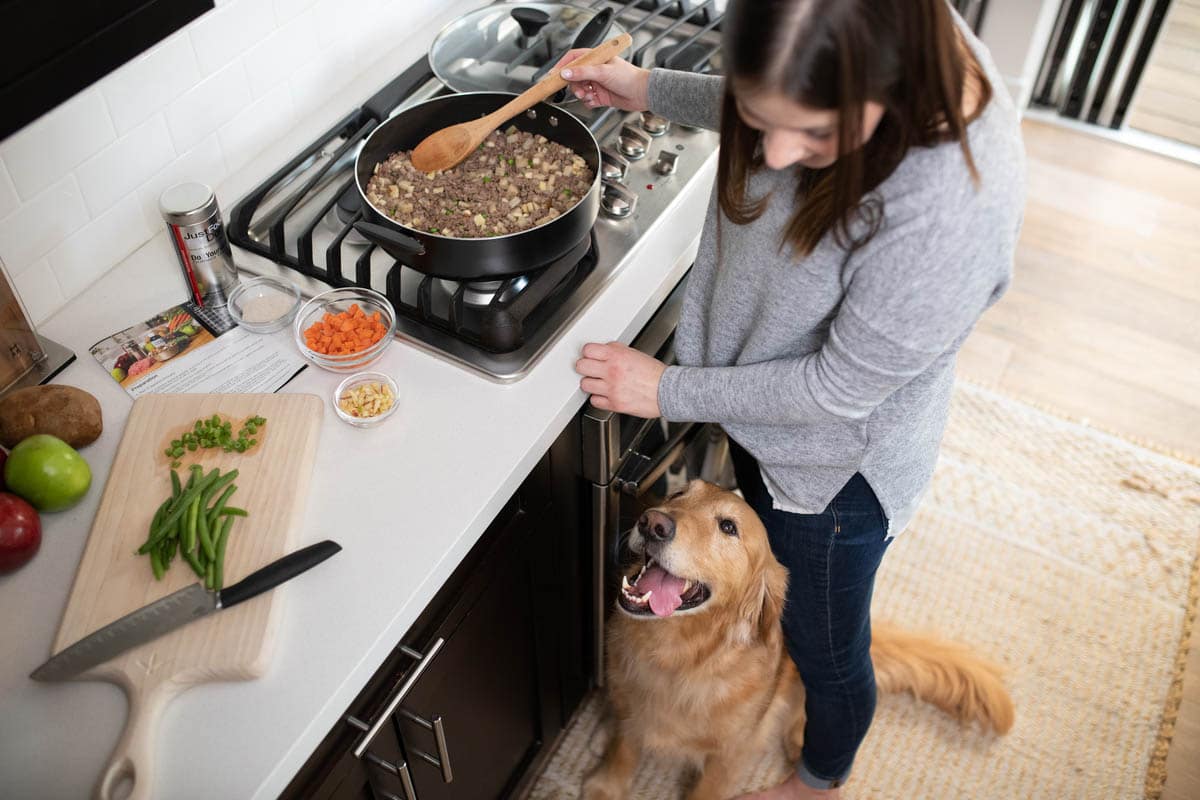Dog Food Trial: Understanding Elimination Diets for Dogs
A dog food trial is essentially an elimination diet to identify the culprit hiding in your dog's food bowl that's causing its allergies.
Does your furry friend suffer from itchy skin, constant ear infections, or recurring vomiting and diarrhea? These frustrating symptoms could point to a food allergy, food intolerance, or environmental allergy. While allergy testing exists, it’s not always definitive. That’s where elimination diet trials (also known as dog food trials) come in – a detective game to identify the culprit hiding in your dog’s food bowl.
Food Allergies vs. Intolerance: Understanding the Difference

Food allergies trigger an allergic reaction — an immune system response to a specific ingredient in your pet’s food. In contrast, food intolerance is a digestive issue where the body struggles to break down certain components in food. Both can cause similar clinical signs, making elimination diets crucial for pinpointing the cause.
A dog food trial is a diagnostic tool involves a complete switch from your dog’s original diet to a new, limited-ingredient food. Choose a novel protein – a protein source your dog hasn’t had before.
A novel protein diet may include meat like venison, kangaroo, or lamb. Limited-ingredient kibble and commercial diets are also available. You could also try a home-cooked diet with a single protein and carbohydrate source like sweet potato or brown rice.
Here’s the breakdown of a successful elimination diet trial:
- Consult your veterinarian or veterinary nutritionist: Discuss your dog’s adverse food reactions and their medical history. They can rule out other medical conditions and guide you through the elimination diet process.
- Ditch the Extras: During the trial, discontinue all treats and flavorings. These include flavored medications and topicals, dental chews, and even flavored toothpastes. These hidden ingredients might contain the allergen you’re trying to identify.
- Patience is Key: The elimination diet trial typically lasts for a minimum of 8-12 weeks, sometimes longer depending on the severity of your dog’s signs.
- Monitor Closely: Pet owners should keep a detailed record of their dog’s gastrointestinal signs or indications of hypersensitivity throughout the trial. This includes noting any improvement in their skin, ears, or digestion.
Related reading: Tips for Transitioning to a New Food
Reintroduction Challenge: Unmasking the Food Culprit
Once your dog’s symptoms improve on the new diet that’s relatively hypoallergenic, it’s time for the reintroduction challenge. Here, you systematically reintroduce individual ingredients from their previous diet, monitoring for a return of clinical signs. This helps identify the specific food allergen causing your dog’s woes.
Dog Food Trials Explained by an Expert
Dr. Laura Wilson, DVM, DACVD, explains what dog food trials are, how she approaches them with her clients, and how they can help your dog figure out its food ingredient allergy.
“Dog food diet trials are a pain in the bottom… It’s not something you can just say, ‘Buy this bag of food or go home, prepare this diet, and come back in eight weeks,’ because you’re pretty much going to guarantee failure.”
“So the idea of a diet trial is if a pet has any symptoms that I think are related to a food allergy, I’m going to get a strict diet history and see what they have eaten.”
“A lot of times when I ask what medications their dog has been taking, owners forget the supplements that they’re choosing to feed. They’ll think of what they are prescribed, but they won’t say ‘oh yeah and this vitamin or this capsule.’ So in order to start the trial we get that full history of what foods they have been on and then I essentially choose something new.”
“…the idea is for the dog to have a novel protein and carbohydrate, limited preservatives, limited fillers. For a period of six to eight weeks, they’re basically only going to eat that food or those ingredients.”
“A lot of times I know it’s not a balanced diet if it’s a home prepared diet. So you have to be careful if it’s a very young dog or if they have any other underlying medical issues, so sometimes I don’t get to do a diet trial the way I might want to. In the perfect case, the dog will have 6 to 8 weeks of the limited ingredient and then when they come back I always try to have a visit or a good phone call before they do the diet re-challenge.”
Getting a Dog to Eat the New Food
Dr. Wilson discusses the importance of a healthy dog diet and some creative ways to incorporate novel foods into your picky dog’s elimination trial.
“One of the difficult parts of the food-allergic dog is once you’ve got them dialed in, well, maybe you want to give him a treat. Maybe they’re doing well, and all of a sudden they decide ‘I don’t want to eat that anymore.'”
“…To combat this I tend to try to keep them on that same diet but then handpick individual ingredients. So maybe we’re looking for something like a custom-prepared diet or home-prepared diet; this is your base. What can you add to it and how can you add palatability?”
“A lot of times it’s not very nutritional, but for a snack I’ll let owners use marshmallows a lot of times sweet potatoes or plain baked potato if they’re not a potato-allergic dog. You can turn it into an ice cube, freeze it, cook it, make a cookie out of it, I have had a lot of owners do a lot of creative things all to help with palatability.”
Beyond Elimination Diets for Dogs: Additional Considerations

While elimination diets are a powerful tool, there are other factors to consider:
- Hydrolyzed Diets: These prescription diets contain proteins broken down into tiny fragments that the immune system shouldn’t recognize.
- Board-Certified Veterinary Dermatologist: If your dog’s skin infections like dermatitis are severe and recurring flareups, a veterinary dermatology visit might be necessary.
- Over-the-counter Supplements: While tempting, avoid giving your dog over-the-counter supplements to address allergies. Consult your DVM for a personalized plan.
Food Allergies Don’t Have to Hinder Happiness
With an elimination diet trial and guidance from your veterinarian, you can crack the code behind your dog’s food sensitivities. Remember, a limited-ingredient diet that avoids the identified allergens can significantly improve your dog’s quality of life. With a happy pup and a newfound peace of mind, everyone wins!
This content is for informational use only and does not replace professional nutrition and/or medical advice, diagnosis, or treatment. It is not a substitute for and should not be relied upon for specific nutrition and/or medical recommendations. Please talk with your veterinarian about any questions or concerns.








